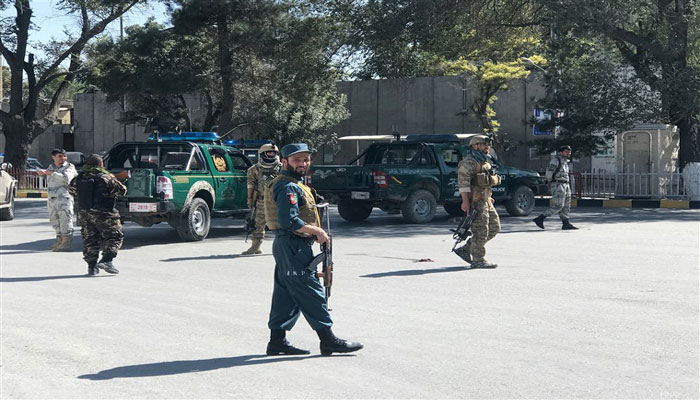At least 62 killed, 33 wounded in Afghan mosque blast: officials
The explosion, which witnesses said collapsed the mosque´s roof, took place in eastern Nangarhar province and wounded at least 55 people, provincial governor spokesman Attaullah Khogyani told AFP.
JALALABAD: The death toll from an attack on a mosque in Afghanistan during Friday prayers has risen to 62, authorities in the eastern Nangarhar province said.
The toll "has risen to 62 dead and 33 injured," said a spokesman for the local governor. The Taliban have condemned the attack and blamed it on Daesh group.
The explosion inside an Afghan mosque during Friday prayers, which witnesses said collapsed the mosque´s roof, took place a day after the United Nations said violence in the country had reached "unacceptable" levels.
A doctor at a hospital in Haska Mina gave a slightly higher toll, telling AFP that "around" 32 bodies had been brought in, along with 50 wounded.
There was no immediate claim of responsibility. Both the Taliban and the Daesh group are active in Nangarhar province.
Witnesses said the roof of the mosque had fallen through after the "loud" explosion, the nature of which was not immediately clear.
"Dozens of people were killed and wounded and were taken in several ambulances," Haji Amanat Khan, a 65-year-old local resident, told AFP.
The blast came after the UN released a new report on Thursday saying an "unprecedented" number of civilians were killed or wounded in Afghanistan from July to September.
The report, which also charts violence throughout 2019 so far, underscores how "Afghans have been exposed to extreme levels of violence for many years" despite promises by all sides to "prevent and mitigate harm to civilians".
It also noted the absurdity of the ever-increasing price paid by civilians given the widespread belief that the war in Afghanistan cannot be won by either side.
"Civilian casualties are totally unacceptable," said the UN´s special representative in Afghanistan, Tadamichi Yamamoto, adding they demonstrate the importance of talks leading to a ceasefire and a permanent political settlement.
The figures -- 1,174 deaths and 3,139 injured from July 1 until September 30 -- represent a 42 percent increase compared to the same time period last year.
The UN laid most of the blame for the spike at the feet of "anti-government elements" such as the Taliban, who have been carrying out a bloody insurgency in Afghanistan for more than 18 years.
July alone saw more casualties than in any other month on record since the United Nations Assistance Mission in Afghanistan (UNAMA) began documenting the violence in 2009.
The first six months of 2019 had seen casualties drop slightly compared to previous years.
But the violence has surged so far in the third quarter that it yanked the overall total for the year back on par with the bloodiest since NATO withdrew its combat forces at the end of 2014.
-
Costco $20 rule explained as employee pay climbs across North America
-
Tumbler Ridge school lockdown underway as RCMP investigate school shooting
-
Jaafar Jackson breaks silence on becoming Michael Jackson
-
Fugitive crypto scammer jailed for 20 years in $73m global fraud
-
Horrifying pictures of the kidnapper of Savannah Guthrie's mother released
-
Schoolgirl eaten alive by pigs after brutal assault by farmworker
-
Activist shocks fellow conservatives: 'Bad Bunny is winner'
-
Minnesota man charged after $350m IRS tax scam exposed












